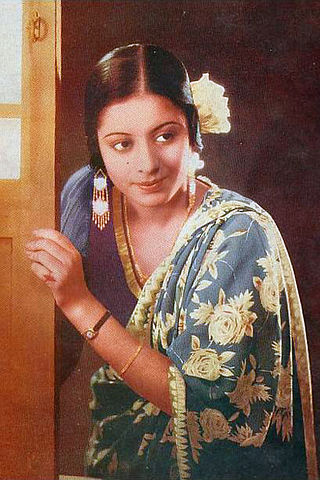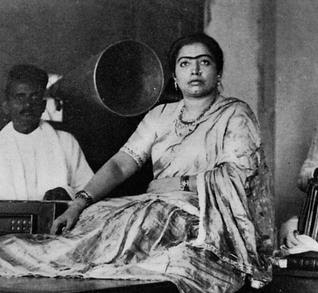Related Research Articles

Kundan Lal Saigal, often abbreviated as K. L. Saigal, was an Indian singer and actor who worked in Hindi cinema, which was centred in Calcutta (Kolkata) during Saigal's time, but is currently based in Bombay (Mumbai). Saigal's unique voice quality which was a mixture of baritone and soft tenor was the benchmark for most of the singers who followed him. In fact it remains the gold standard even today shining through very early and practically primitive recording technology. He did not sing songs on which other actors would lip-sync for the camera. It was only towards the very last stages of his career, during 1945 to 1947, that he sang to make studio recordings, and these were for himself as the actor on the screen. Thus, while other singers in Hindi Cinema are playback singers, he was not a playback singer.

New Theatres is an Indian film studio. It was formed in Calcutta by producer B. N. Sircar. It was formed on February 10th, 1931. The company motto was "Jivatang Jyotiretu Chhayam," meaning, "Light infusing shadows with life." Sircar preferred to function roughly analogous to an executive producer. He built a processing laboratory, and acquired staff. Once a film subject was selected and a team assembled to create the picture, Sicar ensured that adequate funds were provided, while refraining from interfering with its execution. He made New Theatres a symbol of Bengali cinema's artistic good taste and technical excellence.

Mirza Wajid Ali Shah was the eleventh and last King of Awadh, holding the position for 9 years, from 13 February 1847 to 11 February 1856.

Siddheswari Devi was a legendary Hindustani singer from Varanasi, India, known as Maa (mother). Her music embodied the Banaras Gharana style, which focuses on conveying deep emotions and feelings through musical notes and voice modulations. A stalwart figure in thumri, Siddheshwari's repertoire also encompassed khayals, dhrupads, dadras, tappas, kajris, chaitis, horis, and bhajans.

Kanan Devi was an Indian actress and singer. She was among the early singing stars of Indian cinema, and is credited popularly as the first star of Bengali cinema. Her singing style, usually in rapid tempo, was used instrumentally in some of the biggest hits of New Theatres, Kolkata.
Babul is an old Hindi term for father indicating a daughter's affection and used in Indian literature at the separations of fathers and daughters. The term is now mainly used in Bollywood songs in the context of a newly married daughter leaving her father's home.

Gauhar Jaan was an Indian singer and dancer from Kolkata.

Leela Desai, aka Lila Desai, was an Indian actress in the 1930s and 1940s. She was the daughter of Umedram Lalbhai Desai and his second wife Satyabala Devi, a musician of the early 1900s.

Nayyara Noor was a Pakistani playback singer, considered one of Pakistan's most popular singers. She was known for performing in live ghazal singing concerts in Pakistani TV shows and in concert halls around the country.
Lagan is a 1941 Indian Hindi language film. It was the fifth highest grossing Indian film of 1941. The film was directed by Nitin Bose for New Theatres Ltd. Calcutta. The film was a bilingual with K. L. Saigal and Kanan Devi acting as the lead in its Bengali language version, Parichaya. The music for both versions was by R. C. Boral. This was the last film Saigal did for New Theatres, Calcutta, before his move to Bombay to make films for different studios there.

Meri Bahen is a 1944 Hindi language film. It was the fourth highest-grossing Indian film of 1944. Produced by New Theatres, Ltd. Calcutta, and directed by Hemchander Chunder. It starred K. L. Saigal, Sumitra Devi, Akhtar Jehan, Chandrabati Devi, Nawab, and Tulsi Chakraborty. The music direction was by Pankaj Mullick with lyrics by Pandit Bhushan.
Babul Mora Naihar Chhooto Jaye is a popular Hindustani classical music song (thumri) in Raag Bhairavi.
Phani Majumdar was a pioneering Indian film director, who worked in Bengali and Hindi cinema, most known for his film Street Singer (1938) starring K.L. Saigal noted for its song, Babul Mora Naihar Chhooto Jaye, Meena Kumari classic Aarti (1962) and Oonche Log (1965). He also worked in Singapore, where he notably made Hang Tuah (1955) in Malay, which was nominated for the Golden Bear at the 7th Berlin International Film Festival.

Dushman is a 1939 Hindi social romantic drama film. It was directed by Nitin Bose for New Theatres Calcutta Production. The film starred K. L. Saigal, Leela Desai, Najmul Hassan, Prithviraj Kapoor, Nemo and Jagdish Sethi. The music was composed by Pankaj Mullick and the lyrics were written by Arzu Lucknavi. Nitin Bose besides directing also wrote the story and wielded the camera for the film. The dialogue writer was Sudarshan. The story subject about tuberculosis was suggested as a propaganda film by Viceroy Lord Linlithgow and his wife, who were then the Chairman and Patron of King George’s Tuberculosis Fund.

Vidyapati is a 1937 Bengali biopic film directed by Debaki Bose for New Theatres. It starred Pahari Sanyal as Vidyapati. His costars in the film were Kanan Devi, Prithviraj Kapoor, Chhaya Devi, Leela Desai, K. C. Dey and Kidar Sharma. The music was by R. C. Boral and lyrics by Kidar Sharma. Debaki Bose and Qazi Nazrul Islam wrote the story, screenplay and dialogues. The story is about the Maithili poet and Vaishnava saint Vidyapati. The songs of the film became popular and the lyrics though encapsulating Vidyapati's poetry were considered bold for its time. This however ensured the film garnered crowds at the theatres making it a big success of 1937.
Mohabbat Ke Ansu is a 1932 Indian Urdu-language social romantic film. It was directed by Premankur Atorthy for New Theatres Ltd. Calcutta. The music for the film was directed by R. C. Boral. The film starred K. L. Saigal in his debut role with Akthari Muradabadi, Mahajabeen, Ansari and Sadiq. According to reports the film was not successful however Nevile claims that the "debut was successful beyond expectations" as it led to Saigal acting in several New Theatres films.
Pujarin is a 1936 Hindi social film. It was directed by Prafulla Roy for International Film Craft. The film was based on a story by writer Sarat Chandra Chattopadhyay from his story "Dena Paona". The film was the remake of the Bengali film Dena Paona directed by Premankur Atorthy. The music direction was by Timir Baran with lyrics by Pandit Bhushan and Kidar Sharma.The film starred K. L. Saigal, Chandrabati Devi, K. C. Dey, Pahari Sanyal and Rajkumari. The story is about a reckless immoral youth who marries for money then deserts his wife due to circumstances, only to return as an aristocrat and reform through the love of his wife.
Sathi is a 1938 Indian Bengali film directed by Phani Majumdar and produced by New Theatres. It was the Bengali version of Street Singer and the film was the debut of Phani Majumdar as a director. The film's cast includes K. L. Saigal, Kanan Devi, Boken Chatto, Amar Mullick, Sailen Chowdhury, and Shyam Laha. The story involves two young street children growing up together, singing in the streets and hoping to make it big in the show world. The film was one of Saigal's "most famous films" and a "classic" as far the music and songs of the films were concerned. The music was composed by R. C. Boral with lyrics by Ajoy Bhattacharya.
References
- ↑ "The Street Singer - 1938". 2017. Retrieved 18 December 2017.
- 1 2 Van der Heide, William (2002). Malaysian Cinema, Asian Film: Border Crossings and National Cultures. Amsterdam University Press. ISBN 9789053565803.
- 1 2 Nevile, Pran (2011). K. L. Saigal The Definitive Biography. India: Penguin Books. p. 144. ISBN 9780141406343.
- ↑ CITWF. "Street Singer". citwf.com. Alan Goble. Retrieved 18 July 2014.
- ↑ "Street Singer 1938". hindigeetmala.net. hindigeetmala. Retrieved 18 July 2014.
- 1 2 Patel, Bhaichand (2012). Bollywood's Top 20: Superstars of Indian Cinema -KL Saigal. India: Penguin Books. ISBN 9780670085729 . Retrieved 18 July 2014.
- ↑ Nevile, Pran (2004). K L Saigal: Immortal Singer and Superstar. India: Nevile Books. ISBN 9788190116619.
- ↑ Anantharaman, Ganesh (2008). Bollywood Melodies: A History of the Hindi Film Song. India: Penguin Books. ISBN 9780143063407 . Retrieved 18 July 2014.